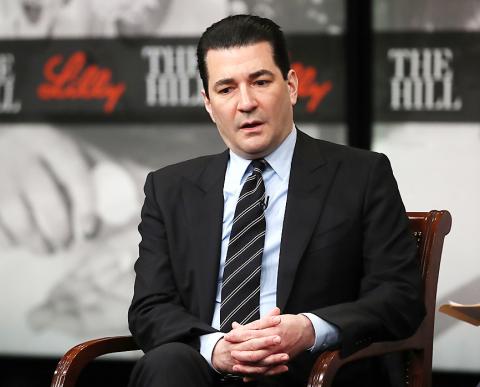With weeks to go in his tenure, US Food and Drug Administration (FDA) Commissioner Scott Gottlieb squared off with two companies at the center of his efforts to halt a surge in teen vaping.
Gottlieb, who plans to leave his post on April 5, said at an event in Washington that he had a contentious meeting last week with executives from Marlboro maker Altria Group Inc and Juul Labs Inc.
Late last year, Altria took a US$12.8 billion stake in Juul, maker of a popular vaping device, at the same time that the companies had promised to increase efforts to keep kids from getting hooked on e-cigarettes.

Photo:AFP
Miffed by the transaction, Gottlieb had summoned the companies to Washington to provide answers.
“The e-cigarette industry has been overly dismissive” of the risk that kids could become addicted to nicotine through e-cigarette use, Gottlieb said on Tuesday at the Brookings Institution. “We’re capturing an exploding epidemic right now.”
The FDA chief raised the possibility of temporarily pulling pod-based nicotine products off the market if youth vaping numbers continue to rise substantially.
Sales could resume if manufacturers can show that their devices are geared toward adult cigarette smokers trying to quit, and not kids.
“It was a difficult meeting,” the commissioner said, adding that there was a “disconnect” between the companies’ priorities and those of health officials.
He added that it appeared Altria’s decision to purchase a stake in Juul was purely a business decision and not driven by public health concerns.
Shares of Altria fell 2.2 percent to US$56.01 in New York on Tuesday, the biggest drop since January.
Altria and Juul did not specifically respond to Gottlieb’s characterization of the meeting.
Both companies said they remain committed to combating underage use of e-cigarettes.
“The FDA is going to have to very carefully calculate its action against the entire category of pod-based products,” Gottlieb said.
If the vaping products are pulled from the market, the FDA could allow the companies to resume selling them after a review, he said.
The agency is working on defining exactly what constitutes a pod-based product in case it needs to take such action, he added.
Gottlieb also said the FDA’s proposed rule to cut nicotine in cigarettes to non-addictive levels would likely be ready for review by the administration of US President Donald Trump this summer.
Doing so could cause about 5 million adult smokers to quit smoking in the first year of adoption, the FDA has previously reported.
Separately, San Francisco officials on Tuesday proposed legislation that would ban the sale of e-cigarettes in the city and prohibit companies like Juul from occupying city-owned property, the San Francisco Chronicle reported.
The FDA last week released a draft guideline on its much-anticipated plan to limit the sales of most flavored e-cigarettes.
The proposal calls for enhancing enforcement against flavored e-cigarette sales in retail locations where a minor can enter at any time, such as a convenience store or gas station.
The restrictions would not apply to tobacco, mint or menthol-flavored e-cigarettes.
Gotlieb, who has taken heat from senators and industry leaders over a plan to ban menthol cigarettes, declined to comment specifically on next steps for the initiative following his departure.
However, he did say he thinks the long-term goal is to remove “characterizing flavors” from all tobacco products.

In Italy’s storied gold-making hubs, jewelers are reworking their designs to trim gold content as they race to blunt the effect of record prices and appeal to shoppers watching their budgets. Gold prices hit a record high on Thursday, surging near US$5,600 an ounce, more than double a year ago as geopolitical concerns and jitters over trade pushed investors toward the safe-haven asset. The rally is putting undue pressure on small artisans as they face mounting demands from customers, including international brands, to produce cheaper items, from signature pieces to wedding rings, according to interviews with four independent jewelers in Italy’s main

Japanese Prime Minister Sanae Takaichi has talked up the benefits of a weaker yen in a campaign speech, adopting a tone at odds with her finance ministry, which has refused to rule out any options to counter excessive foreign exchange volatility. Takaichi later softened her stance, saying she did not have a preference for the yen’s direction. “People say the weak yen is bad right now, but for export industries, it’s a major opportunity,” Takaichi said on Saturday at a rally for Liberal Democratic Party candidate Daishiro Yamagiwa in Kanagawa Prefecture ahead of a snap election on Sunday. “Whether it’s selling food or

CONCERNS: Tech companies investing in AI businesses that purchase their products have raised questions among investors that they are artificially propping up demand Nvidia Corp chief executive officer Jensen Huang (黃仁勳) on Saturday said that the company would be participating in OpenAI’s latest funding round, describing it as potentially “the largest investment we’ve ever made.” “We will invest a great deal of money,” Huang told reporters while visiting Taipei. “I believe in OpenAI. The work that they do is incredible. They’re one of the most consequential companies of our time.” Huang did not say exactly how much Nvidia might contribute, but described the investment as “huge.” “Let Sam announce how much he’s going to raise — it’s for him to decide,” Huang said, referring to OpenAI

Nvidia Corp’s negotiations to invest as much as US$100 billion in OpenAI have broken down, the Wall Street Journal (WSJ) reported, exposing a potential rift between two of the most powerful companies in the artificial intelligence (AI) industry. The discussions stalled after some inside Nvidia expressed concerns about the transaction, the WSJ reported, citing unidentified people familiar with the deliberations. OpenAI makes the popular chatbot ChatGPT, while Nvidia dominates the market for AI processors that help develop such software. The companies announced the agreement in September last year, saying at the time that they had signed a letter of intent for a strategic